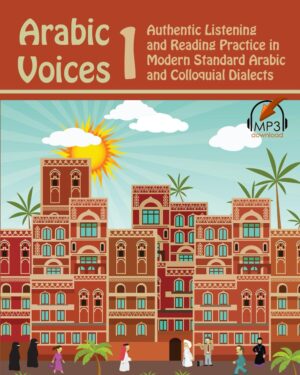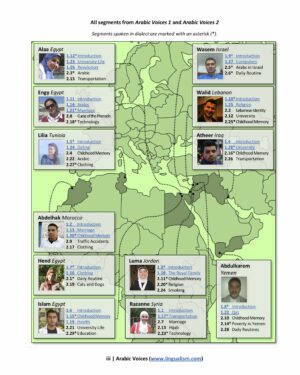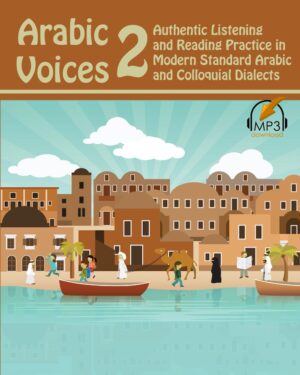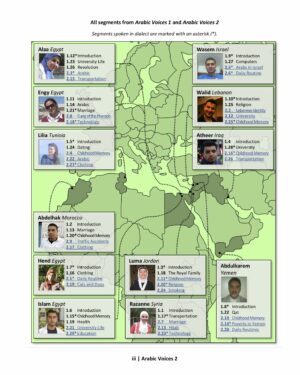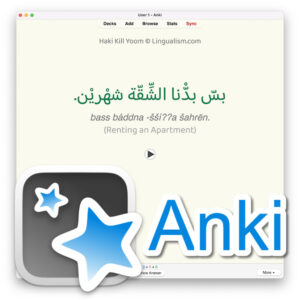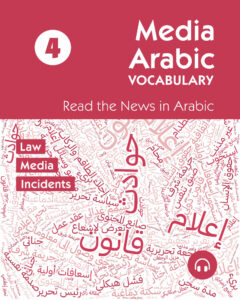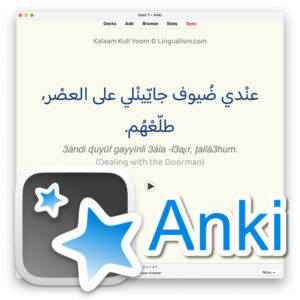🎉BLACK FRIDAY SALE! 🛍️SAVE 25% for a limited time. Use coupon code BLACK24 at checkout. Sale ends November 30, 2024.
Home » Modern Standard Arabic » Razanne’s Self-Introduction
Razanne’s Self-Introduction
| Greetings! [00:00] | السلام عليكم ورحمة الله وبركاته. | |
| Hello and welcome to Lingualism. [00:03] | أهلًا ومرحبًا بكم في Lingualism. | |
| My name is Mostafa Ahmed and I teach Arabic to non-native speakers. [00:06] | اسمي مصطفى أحمد وأنا أُدرِسُ اللغة العربية لغير الناطقين بها. | |
| I'm honored to present to you this series of videos which accompany the book Arabic Voices, [00:12] | يشرفني أن أُقدم لكم هذه السلسلة من الفيديوهات، وهي تصاحب كتاب Arabic Voices، | |
| the book that will help you to learn the Arabic language, [00:19] | الكتاب الذي سيعينك على تعلم اللغة العربية، | |
| whether you want to speak Modern Standard Arabic (MSA) or various dialects. [00:24] | سواءً ما كنت تريد أن تتحدث اللغة العربية الفصحى، أم تريد أن تتحدث اللهجات المختلفة. | |
| In this collection of videos, we will comment on what was said by Arabic speakers [00:33] | في هذه المجموعة من الفيديوهات سنقوم بالتعليق على ما قاله متحدثو اللغة العربية | |
| during their talks about their lives, and what they mentioned in the book. [00:41] | أثناء حديثهم عن حياتهم، و... ما ذكروه في الكتاب، | |
| We will comment on the grammar and expressions they used, [00:48] | وسنقوم بالتعليق على ما استخدموه من قواعد نحوية، ومن مصطلحات، | |
| and we will explain some of the concepts that they mentioned during their talks. [00:53] | وسنقوم بشرح بعض المفاهيم التي ذكروها أثناء حديثهم. | |
| Let's begin today with the first video. [01:00] | فهيّا بنا نبدأ اليوم في أولى الفيديوهات؛ | |
| We will comment on what Razanne said about her life in America, what she wants to do, and what she wants to accomplish in her life. [01:04] | سنقوم بالتعليق على ما قالته رزان بشأن حياتها في أمريكا، وما تريد أن تفعله، وما تريد أن تنجزه في حياتها. | |
| We will start by talking about what she said specifically on page 3, line 8. [01:14] | سنبدأ بالحديث عن ما قالته تحديدًا في الصفحة الثالثة، وفي السطر الثامن. | |
| Razanne says, "And then, I intend to do a Master's degree in teaching the Arabic language." [01:25] | تقول رزان: (ومِنْ ثُمَّ، أنوي أن أدرس للحصول على شهادة الماجستير في تعليم اللغة العربية). | |
| Prior to that, says Razanne: "I also aspire to finish my studies here in America to get my degree, and then..." [01:35] | قبل ذلك، تقول رزان: (أطمح أيضًا إلى أن أُنهي دراستي هنا في أمريكا، لأحصل على الشهادة)؛ [ومِنْ ثُمَّ]. | |
| Razanne uses a connector here: ومن ثُمَّ (so, then). "Then I intend to get a master's degree..." to link what she's doing now and what she wants to achieve. [01:46] | تستخدم رزان هنا أداة ربط، وهي (ومِنْ ثُمَّ، أنوي أن أدرس للحصول على شهادة الماجستير)، لتربط بين ما تفعله الآن وما تريد أن تحققه. | |
| It links the objective and the action using the connector ومن ثُمَّ. [02:00] | فهي تربط بين الغاية والفعل باستخدام أداة ربط وهي [ومِنْ ثُمَّ]. | |
| Actually, the correct, or the most accurate, pronunciation here for this connector is ومن ثَمَّ and not ومن ثُمَّ. [02:08] | وفي الحقيقة، هنا ال... ال... النطق الصحيح أو الأدق لهذه... ال... لهذه... لأداة الربط هذه هي [ومِنْ ثَمَّ]، وليس [ومِنْ ثُمَّ]. | |
| This is a mistake that some Arabic speakers make when they speak MSA. [02:23] | وهذا خطأ يقوم به بعض متحدثو اللغة العربية عندما يتحدثون بالعربية الفصحى، | |
| The book points out that Arabic speakers make some mistakes when they speak MSA. [02:29] | وقد ذُكر في الكتاب أن بعض متحدثي اللغة العربية يقومون ببعض الأخطاء عند حديثهم بالعربية الفصحى. | |
| This is because we do not speak MSA in our daily lives. [02:37] | وهذا يرجع لأننا لا نتحدث العربية الفصحى في حياتنا اليومية، | |
| Rather, it is the language we use... that we learn and use in specific situations, and mostly we use it in official situations, so there will be some errors. [02:42] | بل هي لغة نستخدم... ندرسها ونستخدمها في مواقف محددة، وغالبًا ما نستخدمها في المواقف الرسمية، ولذلك يكون هناك بعض الأخطاء. | |
| So, the correct pronunciation for this word is /wa min thamma/, and not /wa min thumma/. We use this connector between the purpose and the verb. [02:55] | فالنطق الصحيح للكلمة هو [ومِنْ ثَمَّ] وليس [ومِنْ ثُمَّ]، ونستخدم أداة الربط هذه للربط بين الغاية والفعل؛ | |
| We mention first the purpose, and then verb. [03:07] | نذكر الغاية أولًا، ثم بعد ذلك الفعل. | |
| We can use other connectors like ومن أجل ذلك (and that's why). [03:11] | يمكننا استخدام أداة ربط أخرى مثلًا: [ومن أجل ذلك]. | |
| We can say: "I also aspire to finish my studies here in America to get my degree, and that's why, I intend to study for a master's degree." [03:17] | فيمكننا أن نقول: (أطمح أيضًا إلى أن أُنهي دراستي هنا في أمريكا للحصول على الشهادة، ومن أجل ذلك، أنوي أن أدرس للحصول على شهادة الماجستير). | |
| We can use وبُناءً عليه (accordingly): "Accordingly, I intend to study for a master's degree in teaching the Arabic language." [03:31] | يمكننا أن نستخدم [وبُناءً عليه]؛ (وبُناءً عليه، أنوي أن أدرس للحصول على شهادة الماجستير في تعليم اللغة العربية). | |
| We can use وبِـالتالي ("and therefore"). [03:41] | يمكننا أن نستخدم [وبِالتالي]، | |
| And therefore, I intend to study for a master's degree. [03:44] | (وبالتالي أنوي أن أدرس للحصول على شهادة الماجستير). | |
| You can use these connectors to connect the objective and the action. [03:50] | أدوات الربط هذه، يمكنك أن تستخدمها لتربط بين الغاية والفعل. | |
| Let's go to line 9 and see what Razanne says here. [03:58] | لنذهب إلى السطر التاسع ونرى ما قالته رزان هنا. | |
| She says, "...so I can study at the university and became a professor." Here, Razanne uses another connector (conjunction): كَيْ (so that, in order to). [04:04] | هي تقول: (كَيْ أستطيع أن أُدرِّس في الجامعة وأُصبح أُسْتاذة)، فرزان هنا تستخدم أداة ربط أخرى وهي [كَيْ]. | |
| In this case, Razanne uses كَيْ to link what she said to the reason. [04:15] | وفي هذه الحالة، رزان تستخدم [كي] لِتربط بين ما قالته وبين السبب. | |
| She wants to get a master's degree in order to be able to teach at the university and become a professor. [04:23] | (هي تريد أن تحصل على شهادة الماجستير، كي تستطيع أن تُدرِّس في الجامعة وتصبح أستاذة). | |
| You can use... we can use... Instead of كَيْ, we can also say لِـكَيْ by putting a laam in front of كَيْ. [04:31] | يُمكنها... يُمكننا أن نستخدم بدلًا من [كي]، يمكننا كذلك أن نقول [لِكَيْ] باستخدام [اللام] قبل [كي]. | |
| You can also just use لِـ (so that, in order to)...the reason is here. [04:42] | يمكنك أن تستخدم كذلك [لِـ]، [اللام] فقط لِلسبب هنا، | |
| So, she says, "She wants to get a Master's degree in teaching Arabic to non-native speakers so that she can teach at the university." [04:48] | فتقول: (هي تريد أن تحصل على شهادة الماجستير في تعليم اللغة العربية لغير الناطقين بها لِتستطيع أن تدرِّس في الجامعة). | |
| We can use another conjunction, حتّى (so that) to mention the reason. [04:59] | يمكننا أن نستخدم أداة ربط أخرى وهي [حتى] لنذكر السبب. | |
| We can say, "She wants to get a Master's degree in teaching Arabic to non-native speakers so that she can teach at the university and become a professor." [05:05] | فيمكننا أن نقول: (هي تريد أن تحصل على شهادة الماجستير في تعليم اللغة العربية لغير الناطقين بها حتى تستطيع أن تدرِّس في الجامعة وتصبح أستاذة). | |
| Any of these connectors, you can use to connect to the action and the reason. [05:19] | كل هذه أدوات الربط يمكنك ...أن... أيٍ من هذه هي الأدوات يمكنك أن تستخدمها للربط بِ... بين الفعل والسبب؛ | |
| You mention the reason at the end. [05:32] | تذكر السبب مؤخرًا. | |
| Great! So, this was commentary about what she said Razanne on lines 8 and 9. [05:35] | عظيم! فهذا تعليق عن ما قالته رزان في السطر الثامن والسطر التاسع. | |
| Now let's go to the analysis of what Razanne said on line 17 on page 4. [05:44] | ولنذهب إلى ما قالته رزان في... تحديدًا في السطر السابع عشر، وهذا في الصفحة الرابعة؛ | |
| Razanne is talking about one of her students and says, "He is a clever boy and can learn quickly." Razanne uses here the verb يستطيع and after the verb here she uses a masdar (verbal noun). [05:56] | تتحدث رزان عن أحد طُلابها وتقول: (وهو ولدٌ ذكي، ويستطيع التعلم بسرعة). تستخدم رزان هنا الفعل [يستطيع]، وبعد الفعل هنا تستخدم [المصدر]؛ | |
| After the verb, you can use a verbal noun, such as "I can learn", "I can read", "I can write in Arabic" and so on. [06:13] | فبعد الفعل [يستطيع]، يمكنك أن تستخدم [المصدر الصريح] مثل: (أستطيع التعلم، أستطيع القراءة، أستطيع الكتابة باللغة العربية)، وهكذا. | |
| But you can also use what we call "an interpreted masdar." [06:27] | ولكن يمكنك كذلك أن تستخدم ما نسميه [بالمصدر المُؤوِل]، | |
| The interpreted masdar is أن plus a present tense verb. [06:33] | و[المصدر المُؤوِل] هو [أن] و[الفعل المضارع]. | |
| Instead of saying أستطيع القراءة you can say أستطيع أن أقرأ (I can read). [06:39] | فبدل أن تقول (أستطيع القراءة)، يمكنك أن تقول (أستطيع أن أقرأ)؛ | |
| Rather than أستطيع الكتابة, أستطيع أن أكتب (I can write). [06:47] | بدلًا من (أستطيع الكتابة)، (أستطيع أن أكتب)؛ | |
| Instead of أستطيع السّماع, أستطيع أن أسمع (I can hear); and so on. [06:53] | بدلًا من (أستطيع السماع)، (أستطيع أن أسمع)، وهكذا. | |
| You can use the real masdar or interpreted masdar after such verbs, verb "can", for example, or "want to" and so on. [06:59] | فيمكنك استخدام [المصدر الصريح] أو [المصدر المؤول] بعد هذه الأفعال، الفعل [يستطيع] مثلًا أو الفعل [أريد]، وهكذا. | |
| There is a group of verbs mentioned in the book then you can... that you have to you a masdar with, whether it be a real masdar or an interpreted masdar. [07:09] | هناك مجموعة من الأفعال وهي مذكورة في الكتاب، بعدها يمكنك بل لابدّ أن تستخدم المصدر، سواء ما كان المصدر الصريح أو المصدر المؤول. | |
| Finally, we will talk about what Razanne said on line 21. She says in this sentence: [07:24] | وأخيرًا سنتحدث عمّا قالته رازان في السطر الواحد والعشرون، وهي تقول في هذه الجملة: | |
| "He makes some mistakes, but he's still good compared to most of the other students." [07:34] | (يقوم ببعض الأخطاء ولكن ما يزال جيد بالنسبة للكثير من الطلاب غيره). | |
| Razanne uses a word here to compare this student to a lot of other students, [07:41] | وتستخدم رزان هنا كلمة لمقارنة هذا الطالب بالكثير من الطلاب غيره، | |
| and this word is... excellent... it's بالنّسبة: "compared to most of the other students." [07:50] | وهذه الكلمة بالتحديد هي... عظيم! هي [بالنسبة] للكثير من الطلاب غيره. | |
| So, here Razanne compares this student to most of the other students, and says he is good compared to most of the other students. [07:58] | فرزان هنا تقارن هذا الطالب بالكثير من الطلاب غيره، وتقول أنه (هو جيد بالنسبة لكثير من الطلاب غيره). | |
| Here, Razanne uses the word بالنّسبة, but we can also to use the word مقارنةً بِـ. [08:09] | فرزان هنا تستخدم كلمة [بالنسبة]، ولكن يمكننا كذلك أن نستخدم كلمة [مقارنةً بِـ]؛ | |
| Instead of بالنّسبة لِـ, you can use مقارنةً بِـ. [08:19] | بدلًا من [بالنسبة لِـ]، يمكنك أن تستخدم [مقارنةً بِـ]. | |
| You can say: "He makes some mistakes, but he's still good compared to many other students." Whether you say بالنّسبة لِـ or مقارنةً بِـ, both are correct. [08:24] | فيمكنك أن تقول: (يقوم ببعض الأخطاء، ولكن ما يزال جيد مقارنةً بالكثير من الطلاب غيره). إذا ما قلت [بالنسبة لِـ] أو [مقارنةً بِـ]، كلاهما صحيح. | |
| And with this, we have finished the commentary about what Razanne said about her life in America. [08:40] | وبهذا نكون قد انتهينا من التعليق عمّا قالته رزان بشأن حياتها في أمريكا. | |
| I hope you found the commentary useful. [08:47] | أتمنى أن تكونوا قد استفدتم من هذا التعليق، | |
| And in the next video, we will comment on what Abdelhak said, and we will explain some of the concepts, as well. [08:51] | وفي الفيديو القادم سنقوم بالتعليق عما قاله عبد الحق، وسنشرح بعض المفاهيم كذلك. | |
| Until we meet again! Take care! Thank you for your kind attention, and goodbye! [09:00] | إلى لقاءٍ آخر، ألقاكم على خير، أشكركم لحسن استماعكم، والسلام عليكم ورحمة الله وبركاته. |
Video Lessons
Arabic Voices MSA Lessons
Arabic teacher Mostafa Ahmed takes us through segments in MSA from Lingualism's book Arabic Voices 1: Authentic Listening and Reading Practice in Modern Standard Arabic and Colloquial Dialects, explaining interesting points of grammar and vocabulary.

